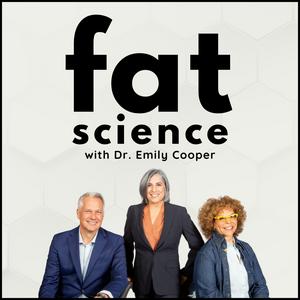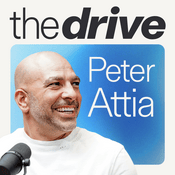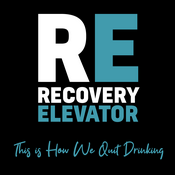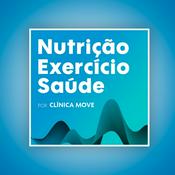120 episódios
- his week on Fat Science, Dr. Emily Cooper, Mark Wright, and Andrea Taylor answer listener mailbag questions that get to the heart of metabolic health. The team explains the real difference between meals and snacks, discusses whether GLP-1 medications can be appropriate for children in complex cases, explores why some people appear to be “non-responders” to Wegovy, and breaks down why alarming headlines about rapid weight regain miss the bigger metabolic picture. They also explain how to set a goal weight using body composition, labs, and overall health—rather than the scale alone.
Key Questions Answered
• What separates a meal from a snack metabolically?
• Why can grazing all day backfire—even with healthy food?
• Are GLP-1s ever appropriate for kids?
• Why do some people feel hungrier as GLP-1 doses increase?
• How are PCOS and insulin dysregulation connected?
• What is a mixed meal tolerance test, and why does it matter?
• Do GLP-1 users really regain weight faster?
• How should goal weight be determined after major weight loss?
Key Takeaways
• Meals provide structure; snacks prevent long gaps—both matter.
• GLP-1 “non-response” often signals deeper metabolic issues.
• Weight regain reflects underlying dysfunction, not personal failure.
• Maintenance dosing must be individualized.
• Body composition matters more than BMI or scale weight.
Dr. Cooper’s Actionable Tips
• Eat structured meals with carbs, protein, and fats.
• Use snacks strategically to avoid long gaps.
• Ask about deeper glucose/insulin testing when progress stalls.
• Prioritize DEXA body composition over scale-based goals.
• Avoid compounded GLP-1s—especially in children.
Notable Quote
“If you stop treating the metabolic dysfunction, the dysfunction is still there—and the body will drive weight back to where it was headed all along.”
—Dr. Emily Cooper
Links & Resources
Podcast Home: https://fatsciencepodcast.com/
Episode References: https://fatsciencepodcast.com/wp-content/uploads/2025/06/Scientific-References-Fat-Science-Episodes.pdf
Cooper Center: https://coopermetabolic.com/podcast/
Resources from Dr. Cooper: https://coopermetabolic.com/resources/
Submit a Question: [email protected]
Fat Science: No diets, no agendas—just science that makes you feel better. This podcast is for informational purposes only and is not intended to be medical advice. - This week on Fat Science, Dr. Emily Cooper, Mark Wright, and Andrea Taylor break down two GLP-1 studies that challenge a major media myth: GLP-1 medications don’t drive weight loss just because people eat less. Instead, drugs like tirzepatide and semaglutide create direct metabolic shifts—including increased fat oxidation and improved fuel partitioning—regardless of appetite.
The team also explores mechanical eating, the psychological impact of “diet food,” and Andrea’s 13-year metabolic recovery journey.
Key Questions Answered
If both groups are dieting, why does the tirzepatide group lose more weight?
What is metabolic adaptation, and why does dieting slow metabolism so sharply?
How do GLP-1s directly increase fat oxidation?
What is mechanical eating, and why do GLP-1 users need it?
Why does ad-lib eating produce different metabolic responses than calorie restriction?
Can mindset alone change hunger hormones? (Yes—the milkshake study.)
Why do diet foods and diet sodas fail to improve metabolic health?
Why is response to GLP-1s so different from person to person?
Key Takeaways
GLP-1s are metabolic drugs—not appetite suppressants.
Their power comes from hormonal effects on fat burning, not reduced food intake.
Calorie restriction still slows metabolism.
Even on GLP-1s, dieting triggers significant metabolic slowdown.
Ad-lib eating outperforms dieting in the research.
Semaglutide users who ate freely did not show the extra metabolic slowdown seen in dieters.
Mechanical eating is the most durable long-term approach.
Regular meals and snacks protect lean mass and prevent famine signaling.
Mindset shapes hormones.
Believing a food is “diet” vs. “indulgent” alters ghrelin and satisfaction.
Track body composition—not just the scale.
DEXA scans show whether you’re losing fat, muscle, or bone.
Dr. Cooper’s Actionable Tips
Don’t diet on GLP-1s. Focus on fueling, not restriction.
Use mechanical eating: predictable meals and snacks, no long gaps.
Prioritize satisfaction: diet foods often backfire hormonally.
Follow your real-world data: long-term changes matter more than short-term scale shifts.
Ask about body composition testing if possible.
Notable Quote:
“What that study proved is that doing the calorie restriction is causing the metabolic slowing… and that’s why it’s so confusing to me that we keep advising people to restrict calories when they’re trying to improve their metabolic function.” —Dr. Emily Cooper
Links & Resources
Podcast Home: https://fatsciencepodcast.com/
Episode References: https://fatsciencepodcast.com/wp-content/uploads/2025/06/Scientific-References-Fat-Science-Episodes.pdf
Cooper Center: https://coopermetabolic.com/podcast/
Resources from Dr. Cooper: https://coopermetabolic.com/resources/
Submit a Question: [email protected]
Dr. Cooper Email: [email protected]
Fat Science: No diets, no agendas—just science that makes you feel better. This podcast is for informational only, and is not intended to be medical advice. GLP-1 Mailbag: Weight Regain, Leptin Resistance, Hypoglycemia & Why Calories Aren’t the Problem
05/1/2026 | 39minThis week on Fat Science, Dr. Emily Cooper, Mark Wright, and Andrea Taylor tackle a wide-ranging mailbag episode with listener questions from the U.S., UK, and Europe. Topics include unexpected weight regain on GLP-1s, post-meal sleepiness and hypoglycemia, metabolic dysfunction despite normal labs, GLP-1 dosing strategies, and why these medications are about metabolism, not appetite suppression.
Key Questions Answered
Why can weight regain happen on GLP-1s even when habits haven’t changed?
How do leptin, ghrelin, injury, stress, and under-fueling affect weight regulation?
What does it mean if you get extremely sleepy after meals—is it hypoglycemia?
Do GLP-1s increase insulin in a harmful way for non-diabetics?
Can you have metabolic dysfunction with normal A1C, cholesterol, and blood pressure?
Do GLP-1 medications “wear off,” and how should dosing be adjusted long term?
Are GLP-1s just appetite suppressants—or true metabolic treatment?
Is it possible to undo decades of calorie counting and restriction-based thinking?
What are the risks of the return to extreme thinness in celebrity culture?
Key Takeaways
Calories don’t explain metabolism. GLP-1 and GIP work across the brain and body—repairing signaling, not just reducing appetite.
Leptin matters after dieting. Years of restriction and weight cycling can weaken leptin signaling, making the brain defend weight gain.
Fueling is foundational. Medication can’t replace adequate food, sleep, and recovery.
Post-meal fatigue is a clue. Reactive hypoglycemia is common and often misunderstood.
Lowest effective dose wins. GLP-1 success is about pacing, not racing to the max dose.
Chasing the “last 10 pounds” can backfire. Cosmetic restriction can create new metabolic problems.
Dr. Cooper’s Actionable Tips
If weight gain appears after injury or stress, focus first on sleep, regular meals, and full fueling, not restriction.
Suspected hypoglycemia? Ask about a mixed meal tolerance test to assess glucose and insulin response.
Stay on the lowest GLP-1 dose that’s working and adjust only when progress truly stalls.
Push back on “appetite suppressant” language—these meds amplify hormones your body already makes.
Notable Quote
“GLP-1s aren’t about eating less—they’re about strengthening metabolic signaling” — Dr. Emily Cooper
Links & Resources
Podcast Home: Fat Science Podcast Website – https://fatsciencepodcast.com/
Podcast Episode References: https://fatsciencepodcast.com/wp-content/uploads/2025/06/Scientific-References-Fat-Science-Episodes.pdfCooper Center for Metabolism & Fat Science Episodes: https://coopermetabolic.com/podcast/
Resources from Dr. Cooper: https://coopermetabolic.com/resources/
Submit a Show Question: [email protected]
Dr. Cooper direct show email: [email protected]
Fat Science breaks diet myths and advances the science of real metabolic health. No diets, no agendas—just science that makes you feel better. This show is informational only and does not constitute medical advice.- This week on Fat Science, Dr. Emily Cooper, Mark Wright, and Andrea Taylor talk with pediatric eating disorder specialist Dr. Julie O’Toole (Kartini Clinic) and pediatric obesity expert Dr. Evan Nadler about what childhood obesity really is: a biologic, metabolic disease—not a willpower problem and not a failure of parenting.
They explore how excess weight, constant hunger, and disordered eating in kids are often signs of underlying metabolic dysfunction and genetics—and why the old “eat less, move more” advice can do real harm, especially when children are shamed or restricted in the name of “health.”
Key Questions Answered
Why is childhood obesity a metabolic disease, not a behavior problem?
How are obesity and eating disorders deeply connected instead of opposite extremes?
What role do GLP-1 medications play in children—and how do we protect against under-fueling?
When should parents suspect genetic drivers like hyperphagia or MC4 mutations?
How can medical treatment for obesity actually reduce disordered eating behaviors?
When does excess weight become a medical issue requiring metabolic evaluation—not another diet?
Key Takeaways
Weight is a symptom. Childhood obesity is often a sign of metabolic dysfunction, not overeating.
Obesity & eating disorders overlap. Restriction can trigger disordered eating; disordered eating can worsen obesity.
“Eat less, move more” harms. Shame-based approaches delay treatment and increase risk of eating disorders.
GLP-1s work metabolically, not just through appetite suppression. Kids still need consistent fueling.
Genetics matter. Single-gene differences can drive severe childhood hunger & rapid weight gain.
Not treating is harm. Avoiding obesity care violates first, do no harm.
Dr. Cooper’s Actionable Tips
If your child is gaining weight or constantly hungry, request metabolic labs (insulin, glucose, lipids, liver, hormones).
If the doctor only says “eat less, move more,” ask: “How are we evaluating metabolism and genetics?”
On GLP-1s? Monitor for under-fueling (skipped meals, low energy, food anxiety) and intervene promptly.
Notable Quote
“Not treating childhood obesity is doing harm. It’s a disease, not a lifestyle choice.” — Dr. Evan Nadler
Links & Resources
Podcast Home: Fat Science Website
Episodes & Show Archive: Cooper Center Podcast Page
Education & Metabolic Resources: coopermetabolic.com/resources
Submit a Show Question: [email protected]
Email Dr. Cooper Directly: [email protected]
Connect with Our Guests
Dr. Evan P. Nadler, MD, MBA – Founder, ProCare Consultants & ProCare TeleHealth
Website: obesityexplained.com
YouTube Channel: Obesity Explained
Dr. Julie K. O’Toole, M.D., M.P.H. – Chief Medical Officer & Founder, Kartini Clinic
Website: kartiniclinic.com
Books: amazon.com/author/julieotoole
*Fat Science breaks diet myths and advances the science of real metabolic health. No diets. No agendas. Just science that makes you feel better. This episode is informational only and not medical advice. - This week on Fat Science, Dr. Emily Cooper, Mark Wright, and Andrea Taylor talk with exercise physiologist Russell Cunningham and patient Becca Wert about a counterintuitive reality: for some people, exercise can actually slow metabolism, stall weight loss, and trigger weight gain—especially when the brain senses a threat to energy availability.
Dr. Cooper explains how overtraining, under-fueling, and even thinking about workouts can activate famine signals in the brain and shut down key hormone pathways and what it takes to rebuild trust so movement becomes helpful instead of harmful.
Key Questions Answered
How can exercise trigger metabolic slowdown and weight gain instead of weight loss?
What lab markers (leptin, ghrelin, thyroid, cortisol, sex hormones) signal that your body is in “conservation mode”?
Why did Becca lose more than 120 pounds after stopping intense workouts—and what did her COVID experience reveal about her metabolism?
How did Russell’s overtraining syndrome develop, and what did his recovery teach him about fueling, rest, and nervous system regulation?
How should fueling before, during, and after activity look different for people who are highly sensitive to energy deficits?
When is it time to pull back on exercise, even if every message you’ve heard says “move more”?
Key Takeaways
Exercise is stress, not magic. When the brain perceives low energy or famine risk, it can respond to exercise by slowing metabolism, shutting down hormones, and defending body fat.
Labs tell the story. Low leptin with high “famine signals,” along with thyroid, cortisol, and reproductive hormone suppression, are red flags that the body is conserving energy—not freely burning fuel.
Fueling beats punishment. For sensitive metabolisms, you often “can’t overdo the fueling” around movement—sports drinks and carbs, even for short sessions, can help reassure the brain that it’s safe.
Movement ≠ grind. Reframing exercise as enjoyable movement and nervous system regulation (walking, gentle climbing, yard work) helps break from all-or-nothing “training” mindsets that can backfire.
Dr. Cooper’s Actionable Tips
If your weight climbs or stalls despite hard workouts and restricted eating, talk with a clinician about metabolic labs instead of just pushing harder.
Cushion any exercise with real fuel: eat before, add carbs/electrolytes during, and refuel after—especially if you have a history of dieting, overtraining, or weight cycling.
Consider starting with low-intensity, pleasant movement and always “leave gas in the tank” instead of chasing exhaustion as the goal.
Notable Quote“Exercise should not be used as a weight loss tool. It should be used as a performance and a health tool.” — Dr. Emily Cooper
Links & ResourcesPodcast Home: Fat Science Podcast Website – https://fatsciencepodcast.com/Cooper Center for Metabolism & Fat Science Episodes: https://coopermetabolic.com/podcast/Resources and education from Dr. Cooper: https://coopermetabolic.com/resources/Submit a Show Question: [email protected]. Cooper direct show email: [email protected]
Fat Science is your source for breaking diet myths and advancing the science of true metabolic health. No diets, no agendas—just science that makes you feel better. The show is informational only and does not constitute medical advice.
Mais podcasts de Saúde e fitness
Podcasts em tendência em Saúde e fitness
Sobre Fat Science
Fat Science is a podcast on a mission to explain where our fat really comes from and why it won’t go (and stay!) away. In each episode, we share little-known facts and personal experiences to dispel misconceptions, reduce stigma, and instill hope. Fat Science is committed to creating a world where people are empowered with accurate information about metabolism and recognize that fat isn’t a failure. This podcast is for informational purposes only and is not intended to replace professional medical advice.
Site de podcastOuça Fat Science, Psicanálise de Boteco e muitos outros podcasts de todo o mundo com o aplicativo o radio.net

Obtenha o aplicativo gratuito radio.net
- Guardar rádios e podcasts favoritos
- Transmissão via Wi-Fi ou Bluetooth
- Carplay & Android Audo compatìvel
- E ainda mais funções
Obtenha o aplicativo gratuito radio.net
- Guardar rádios e podcasts favoritos
- Transmissão via Wi-Fi ou Bluetooth
- Carplay & Android Audo compatìvel
- E ainda mais funções


Fat Science
Leia o código,
baixe o aplicativo,
ouça.
baixe o aplicativo,
ouça.




































